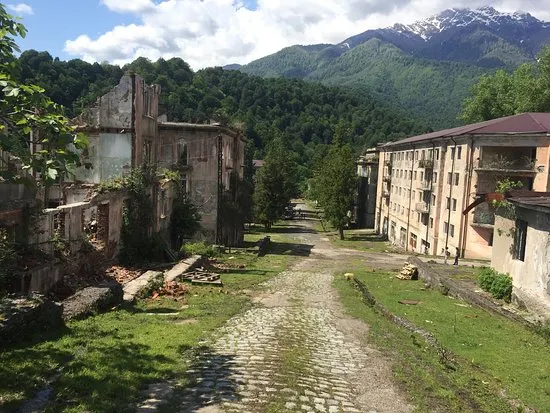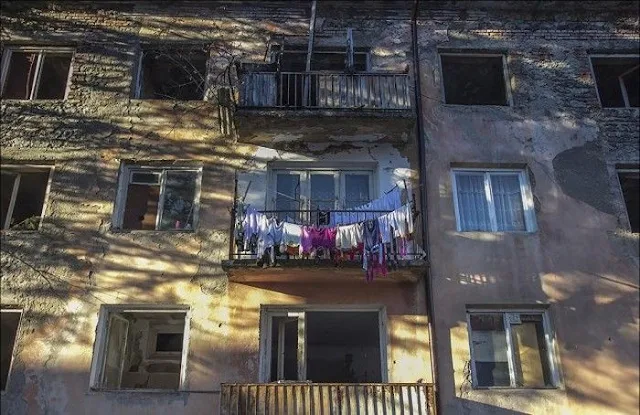Akarmar is a small, yet significant village in the Tkvarcheli district of the Republic of Abkhazia, a region located in the South Caucasus. Tkvarcheli itself is a district in the western part of Abkhazia, an area that has been subject to political and territorial disputes. The Republic of Abkhazia, though de facto independent, is recognized by most countries as part of Georgia.
Here’s a detailed description of Akarmar Tkvarcheli, focusing on its historical, geographical, and cultural aspects:
Location and Geography
Akarmar is situated within the Tkvarcheli district, which lies to the north of the main coastal areas of Abkhazia. Tkvarcheli is characterized by its rugged terrain, featuring hills, rivers, and forests, which create a stunning backdrop for the village. The area is also close to the Rukhi River, one of the major rivers of the region. Akarmar itself sits within a largely rural and mountainous region, offering breathtaking views of the surrounding natural beauty, including thick forests, fertile valleys, and a temperate climate that sustains diverse flora and fauna.
History
The history of Akarmar, like much of Abkhazia, is entwined with the broader history of the region, which has been home to various ethnic groups and cultures over the centuries. Abkhazia has a complex history of governance, shifting between different powers, including the Byzantine Empire, the Ottoman Empire, and Imperial Russia. It was part of Georgia before the Georgian Civil War and the subsequent conflicts in the 1990s, which led to the ongoing territorial dispute.
Historically, Akarmar has been a small village with deep ties to the local culture and traditions. Its residents have lived a rural lifestyle, traditionally engaged in agriculture, livestock farming, and some mining activities. Over the years, the village has seen several changes, especially with the rise and fall of different political entities in the region.
Demographics and Culture
Akarmar, like many villages in Abkhazia, has a predominantly ethnic Abkhaz population. The Abkhaz people, with their unique language and traditions, make up the majority of the inhabitants. However, the village may also have residents from other ethnic groups, such as Georgians, Armenians, and Russians, particularly in the wake of the post-Soviet conflicts.
The local culture in Akarmar is deeply rooted in the traditions of the Abkhaz people, who maintain a rich heritage of oral storytelling, folk music, dance, and traditional crafts. Family and community ties are central to village life. The region's cultural identity is strongly tied to its historical experiences, including the impact of the Georgian-Abkhaz war in the early 1990s.
Economy and Infrastructure
The economy of Akarmar has traditionally been agrarian. The fertile soil of the region supports various crops such as vegetables, fruits, and grains. Additionally, livestock farming is common, with residents raising cattle, sheep, and goats.
During Soviet times, the area was known for its coal mining industry, with the Tkvarcheli district being one of the key centers for coal extraction in Abkhazia. However, following the collapse of the Soviet Union and the subsequent conflicts, the mining industry has seen a decline, and much of the infrastructure is in disrepair.
Akarmar, like many villages in Abkhazia, faces challenges related to infrastructure development. The region has limited access to modern services and amenities due to the ongoing political and economic isolation of Abkhazia. The lack of consistent electricity, running water, and transportation infrastructure has hindered the economic development of the area.
Tourism and Natural Beauty
Akarmar itself is not a well-known tourist destination, but it is part of the larger Tkvarcheli district, which offers significant natural beauty. The region is home to rugged mountain landscapes, untouched forests, and numerous hiking trails, making it an ideal destination for nature lovers, trekkers, and adventure enthusiasts.
Political Context
The political situation in Abkhazia significantly impacts villages like Akarmar. Since the 1990s, Abkhazia has declared independence from Georgia, though it is not internationally recognized by most countries. This has led to political and economic isolation, as well as restrictions on trade, foreign investment, and development assistance. The geopolitical situation remains a key issue, affecting both daily life and long-term prospects for residents.
The uncertainty surrounding the region’s political future also influences the ability of Akarmar to develop its infrastructure, economy, and international relations. While Abkhazia maintains close ties with Russia, this relationship also brings its own set of complexities, particularly regarding regional security and governance.
Environmental Significance
The natural surroundings of Akarmar in the Tkvarcheli district offer ecological value. The district is part of the larger Caucasus mountain range, which is renowned for its biodiversity. The area is home to many endemic species of plants and animals, making it an important ecological area. The forests of the region are dense and teeming with wildlife, including wild boars, deer, foxes, and various bird species.
The region’s temperate climate, characterized by wet winters and mild summers, supports the lush vegetation of the area. The presence of the Rukhi River, along with various smaller streams and waterfalls, adds to the region's natural allure. For anyone interested in nature, Akarmar and its surrounding areas present opportunities for eco-tourism and environmental research, particularly in areas related to biodiversity and conservation.
The forests around Akarmar, in particular, provide natural resources like wood, herbs, and medicinal plants. This abundance of natural resources has traditionally played an important role in the local economy, as many villagers still rely on agriculture and forestry as primary sources of livelihood.
Agriculture and Rural Life
The lifestyle of Akarmar's inhabitants has remained closely tied to the land. The region's fertile soil and favorable climate support a variety of agricultural activities, with crops like potatoes, corn, tomatoes, and tobacco being grown in the fields surrounding the village. In addition to crops, villagers often keep livestock, such as cows, sheep, and goats, which provide milk, meat, and wool.
Traditional farming techniques have been passed down through generations, and despite modernization, many residents continue to practice subsistence agriculture. While some younger generations have moved to larger cities or migrated abroad in search of better economic opportunities, a significant portion of the population still lives off the land.
There’s a sense of deep connection to nature in rural Abkhaz villages like Akarmar. Residents tend to their farms, harvest produce, and maintain a lifestyle that revolves around seasonal cycles. The village's communal life is heavily reliant on cooperation, with neighbors often helping each other during harvests or tending to animals.
Local Cuisine and Traditions
Abkhaz cuisine is an important element of the cultural identity in Akarmar. Traditional dishes are often based on locally sourced ingredients, including vegetables, fruits, dairy, meats, and herbs. Some key elements of Abkhaz cuisine include:
- Mbikh – A type of bread made from cornmeal, often served alongside stews and meats.
- Ajika – A spicy, garlic-based condiment made from hot peppers, tomatoes, and herbs, commonly used to accompany meals.
- Shashlik – A popular grilled meat dish, similar to kebabs, which are often enjoyed during community gatherings or celebrations.
- Cheese and dairy products – Dairy is a major part of the diet, with residents making cheese, yogurt, and kefir from cow or goat milk.
The meals are typically shared among family members and guests, emphasizing the importance of community and hospitality in Abkhaz culture. The tradition of welcoming guests with hearty meals and offering the best of what the land has to offer is a cornerstone of the village’s social life.
Cultural Practices and Festivals
Cultural life in Akarmar reflects the traditions and customs of the Abkhaz people, with particular importance placed on family, hospitality, and respect for nature. Traditional Abkhaz rituals often revolve around family celebrations, seasonal events, and agricultural practices. While formal festivals may be rare in small villages, significant cultural events include weddings, harvest celebrations, and commemorations of important historical or religious dates.
One of the most notable cultural practices in Abkhazia is wedding ceremonies, which often involve extensive rituals and large gatherings of family and friends. Weddings are seen as vital events in the life of the community, and participation in these events strengthens familial and social bonds. Similarly, traditional dances, music, and songs are integral to cultural celebrations, with folk dances being an important part of community festivals.
Religious practices also play a role in village life, although Abkhazia is a region where many people identify more strongly with cultural traditions than with formal religious practices. The Orthodox Christian faith is dominant in Abkhazia, but ancient pagan customs, such as offerings to nature spirits, may also be observed in rural villages like Akarmar.
Challenges Facing the Community
As with many rural areas in Abkhazia, Akarmar faces several challenges due to the ongoing political situation and economic isolation. Some of the key issues include:
Infrastructure Struggles: While Akarmar enjoys natural beauty, it struggles with outdated or underdeveloped infrastructure. Roads may be poorly maintained, and access to utilities like clean water, electricity, and healthcare can be unreliable. The lack of a consistent road network also hampers both trade and tourism, which could otherwise bring economic benefits.
Economic Decline: The collapse of the coal mining industry in Tkvarcheli and the disruption caused by the 1990s Georgian-Abkhaz conflict have left many residents struggling to find sustainable sources of income. With the lack of industrialization and modern agriculture, many families face economic difficulties, leading to limited opportunities for young people and, in many cases, out-migration to larger cities or abroad.
Political Uncertainty: The unresolved political status of Abkhazia continues to have far-reaching consequences for its people. International recognition remains limited, and the region is heavily reliant on Russia for economic and military support. The lack of recognition has led to a lack of international aid, which further compounds the economic challenges faced by residents of Akarmar.
Emigration: In recent years, many younger residents of Akarmar have sought opportunities outside of Abkhazia, particularly in Russia or other countries, seeking employment and better living conditions. This has led to a decline in the population, especially among younger generations, as many are drawn to urban centers or abroad for education or economic opportunities.
Future Prospects
While the challenges are significant, there are signs of hope for the future of Akarmar. The village’s natural beauty and historical significance could potentially lead to more interest in eco-tourism and cultural tourism in the long term, especially if the political situation stabilizes. A focus on sustainable agriculture and organic farming may also provide avenues for growth, as more global attention shifts towards eco-conscious practices.
Moreover, as Abkhazia continues to seek ways to navigate its political status, it’s possible that local initiatives aimed at fostering self-sufficiency, cultural preservation, and improved infrastructure could emerge. It will take time and cooperation, but with strong community ties and the continued resilience of the people, Akarmar can hold onto its traditions while finding a way to adapt to the modern world.
Conclusion
Akarmar in the Tkvarcheli district is more than just a small village; it is a reflection of Abkhazia’s enduring heritage, its natural beauty, and the resilience of its people. Despite the hardships that come with political instability, economic challenges, and infrastructure limitations, the community in Akarmar continues to hold strong to its cultural identity and traditional ways of life. For those willing to explore beyond the mainstream tourist destinations, Akarmar offers a glimpse into the heart of rural Abkhazia, where the past and present coexist in a delicate balance.
If the region receives the international support and stability it needs, Akarmar could very well become a model for sustainable rural development, bridging its rich traditions with modern opportunities in the years to come.












No comments:
Post a Comment
Stay updated with our blog for more quality content! Your feedback is appreciated. Contact us at harshrex@outlook.com with any suggestions.